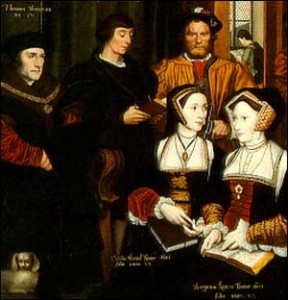
On this day in 1535, Sir Thomas More wrote his final letter. More had been imprisoned in the Tower of London since 17th April 1534 and had been found guilty of high treason on 1st July 1535. Knowing he was due to be executed the following day, More sat and wrote a letter to his beloved daughter, Margaret (Meg) Roper on 5th July. He wrote the letter in coal.
“Our Lord bless you good daughter and your good husband and your little boy and all yours and all my children and all my godchildren and all our friends. Recommend me when you may to my good daughter Cecilye, whom I beseech our Lord to comfort, and I send her my blessing and to all her children and pray her to pray for me. I send her an handekercher and God comfort my good son her husband. My good daughter Daunce hath the picture in parchment that you delivered me from my Lady Coniers; her name is on the back side. Show her that I heartily pray her that you may send it in my name again for a token from me to pray for me.
I like special well Dorothy Coly, I pray you be good unto her. I would wit whether this be she that you wrote me of. If not I pray you be good to the other as you may in her affliction and to my good daughter Joan Aleyn to give her I pray you some kind answer, for she sued hither to me this day to pray you be good to her.
I cumber you good Margaret much, but I would be sorry, if it should be any longer than tomorrow, for it is Saint Thomas even, and the Vtas of Saint Peter and therefore tomorrow long I to go to God, it were a day very meet and convenient for me. I never liked your manner toward me better than when you kissed me last for I love when daughterly love and dear charity hath no leisure to look to worldly courtesy.
Fare well my dear child and pray for me, and I shall for you and all your friends that we may merrily meet in heaven. I thank you for your great cost.
I send now unto my good daughter Clement her algorism stone and I send her and my good son and all hers God’s blessing and mine.
I pray you at time convenient recommend me to my good son John More. I liked well his natural fashion. Our Lord bless him and his good wife my loving daughter, to whom I pray him be good, as he hath great cause, and that if the land of mine come to his hand, he break not my will concerning his sister Daunce. And our Lord bless Thomas and Austen and all that they shall have.”
You can see a photo of the letter at http://www.luminarium.org/renlit/moremargaret.jpg. The original is in the Arundel MS (ref 152).
You can find out more about Sir Thomas More on our Thomas More Bio page and also in Beth von Staats’s wonderful article on his life The Real Wolf Hall – Who was Thomas More.
Notes and Sources
- The Last Letters of Thomas More, edited by Alvaro De Silva.